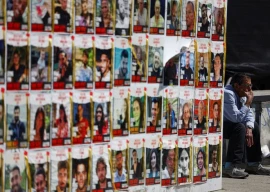
There is an old fable of a criminal who is given the choice of either suffering a hundred lashes or of eating a hundred onions. The convict first opts for onions but soon finds that he is revolted beyond measure. He, therefore, asks to be flogged instead and, of course, finds that he can’t take the pain either. He is then allowed to go back to eating onions but once again finds himself unable to proceed. The net result is that he suffers both punishments.
The fable of the onions and the lashes is normally used as a metaphor for Pakistan’s zigzag progress from dictatorship to democracy and back; how we first thirst for democracy, then get revolted by the corruption and inefficiency that attends it, then get entranced by military rule and its promise of an efficient, technocratic future, then get revolted by the corruption and arrogance that inevitably attends all dictatorships and so stagger back to democracy, only to repeat the whole cycle all over again.
The question, of course, is how to break this cycle of suffering and stupidity. One answer comes to us from the wizards at Betty Crocker. And yes, I’m serious.
In case you don’t know what I’m talking about, let me explain. Betty Crocker is the name of a popular line of baking goods best known for cake and pastry mixes that can be used by busy housewives and untalented cooks (such as myself) to produce reasonably tasty desserts with minimum effort.
Back in the 1950s, the marketing wizards at General Mills (the company which owns the Betty Crocker brand) were perplexed by the failure of instant cakes to achieve popularity even though instant piecrusts and instant biscuits were massive hits. Given that cakes and biscuits contained much of the same ingredients, the failure of instant cakes to sell was, indeed, very odd.
The eventual solution, as figured out by a psychologist called Ernest Dichter, was that instant cakes were so easy that housewives using the mixes didn’t feel any pride in presenting them. The solution adopted, therefore, was to deliberately leave out a few key ingredients such as eggs, milk and oil. These ingredients could then be triumphantly added by the cakemaker who could then — with some justification — claim to have ‘baked’ the cake. Or, as the ad put it, “You and Betty Crocker can bake someone happy.”
Ok, you may ask, but what does all of this have to do with democracy in Pakistan? Part of the answer comes from MIT professor Dan Ariely in his book The Upside of Irrationality.
Some years ago, Ariely actually carried out a series of experiments to see how much people value their own involvement in making things — something which he dubs the “Ikea effect”, named after the ubiquitous furniture store selling goods which need to be assembled by the buyer.
In his first experiment, Ariely asked volunteers to fold a piece of paper into a frog. The volunteers were then asked to value their creations. At the same time, other volunteers who had not been involved in making the frogs were also asked for their opinions. The differences in value were stark.
The creators valued their frogs at an average of 23 cents, while the non-creators valued the frogs at five cents. Subsequently, Ariely had the origami frogs made by experts. In this case, the non-creators valued the frogs at an average of 27 cents (or pretty close to what the creators valued their own frogs).
In his second experiment, Ariely again gave frog-building instructions to volunteers but this time deliberately made the instructions complicated and difficult to follow. The result was that those who completed their task despite the hurdles valued their creations the highest while those who had failed to complete their tasks valued the paper frogs the least.
Ariely’s findings can be summarised as follows: 1) people value things, which they have helped create; 2) the more the effort, the more people value their creations; 3) people don’t value things if they are incomplete, even if they have put great effort into them.
Let’s go back now and look at our political history. What we find are two main things. First, we have consistently maintained political systems that disenfranchise the citizenry of Pakistan. Leaving aside decades of military rule, even our democratic experiments have yielded governments in which decision-making powers have been concentrated in the minimum number of hands (see, e.g., the government of Punjab and the 10 or 15 departments — or whatever number it actually is — personally headed by Shahbaz Sharif).
Second, our experiments in democracy have continuously failed. Every time we have managed to get democracy restored in Pakistan, the net result has been civilian rule of such massive incompetence that the eventual restoration of military dictators has been welcomed.
Put these two factors together and the end result has been a disempowered population whose efforts to establish democracy have continuously failed. Is it any wonder then, especially keeping in view Ariely’s findings, that we have traditionally not valued democracy that highly?
At the same time, Ariely’s insight also gives one explanation for the survival of the current democratic experiment. Lest we forget, the transition from General (retd) Pervez Musharraf to Asif Ali Zardari was not painless but was driven by two separate popular movements: the first being the movement to restore the chief justice and the second being against the declaration of emergency by Musharraf. The democratic transition of 2008 was thus one of the most broadly based post-Independence movements in Pakistan’s history. If the people of Pakistan are now being atypically patient in suffering the foibles of the Zardari government, it is quite possibly because they were atypically involved in establishing this democracy.
The problem though is that the Pakistani public is not infinitely patient. If we are to keep democracy alive in Pakistan, we have no option but to shift to a more broad-based and genuinely participatory democracy. The current system in which four chief ministers and the president/prime minister rule the entire country is not sustainable. Otherwise, we may well find ourselves going through the whole onions and lashes routine all over again.
Published in The Express Tribune, August 23rd, 2012.
COMMENTS (37)
Comments are moderated and generally will be posted if they are on-topic and not abusive.
For more information, please see our Comments FAQ





















1713272658-0/Copenhagen-fire-(1)1713272658-0-270x192.webp)





















Devolution of Power is the dire need of the day as a population of 180 million cannot be governed by four Provincial and one strong Federal Government as they are being represented, governed and served by 1100 parliamentarians and about 50 thousand bureaucrats
All well and good. Just wanted to point out Prof Ariely is a professor at Duke University, not MIT.
@Lala Gee
Suffice to say I am a great fan of the phenomenal intelligence of the Indian commentators.
Its good for you that you acknowledge the truth.
I am not a spokesperson for IK nor I agree with his view point on many issues, yet I think he is a better choice over tried crooks.
As an observer of the democratisation process of Pakistan,I have little interest in your likes and dislikes. I am only interested in finding out, How does your prescription of going to School, College, Unoversity apply to all the players on the political scene. If it is not to be applied to all in the same fashion, then, perhaps, it is better left alone.
People who think electoral process is, all there is to democracy, want more and more elections and hope that this will cleanse the system. well ,we had 4 in one decade of 88onward and situation got from bad to worse. If we continue to drift away from people empowerment , x number of elections is not going to cure this problem.when elected members of Parliament forego their right of choice in favour of their his highness Party chairman cum country president,and do so obediently and loyally in hope of future reward, we are moving towards more authoritarian rule. Introduction of democracy within political parties is absolutely essential before it can be made functional in the country. What we have in our country at the moment may have come through an electoral process but it's not democracy.
@observer:
Suffice to say I am a great fan of the phenomenal intelligence of the Indian commentators.
P.S. I am not a spokesperson for IK nor I agree with his view point on many issues, yet I think he is a better choice over tried crooks.
@gp65: I am afraid you missed the point altogether. I am talking about democratic and structural reforms such as proportional representation, reigning in campaign spending, preventing ballot rigging, more rigorous scrutiny of candidates, devolution of power, independence of NAB, taxation reforms, etc.
@Lala Gee
Why not to make it mandatory to go to school first (local bodies) before going to college (provincial assemblies) and university (national assembly).
Is that how you chose your 'managers'. They actually enter as Messengers and then proceed to Sales Boys and then Office Clerks and Then Accountants and perhaps only then Managers?
Or, join as a Sepoy, go on to NCO, JCO and then Commissioned Officers?
I have serious doubts.
PS- Where does this leave our great hope, The Khan. Has he been to school (local bodies) ever?
To start with people should start paying their taxes and for their electricity they use.
@Mirza: I am afraid I have to agree with Lala Gee on this one. I think what he is suggesting is that the natural process of self-corrective democracy might be too slow. At that rate, we will be like India at best in few decades and most likely worse (since we have extremism and education related issues that can make things worse). So, the solution is to reform at a faster pace (through strategic intervention) than the system is unraveling.
@observer: (alias @Mirza)
"In case you did not notice, the ‘managers’ come from the ‘passengers’. That is what Democracy ia all about. Or, were you thinking of importing the ‘managers’ from Arabia and Afghanistan, as in the past."
Why is it that every time I address @Mirza, some Indian come to his rescue. Or, are you also @Mirza. as well. Any way, why not to implement a scrutiny system to filter out toddlers and midgets to ensure only those contest in elections who are not only able to run but also run fast, just like hiring a manager for a business. Why not to make it mandatory to go to school first (local bodies) before going to college (provincial assemblies) and university (national assembly). Why not to enforce democracy on party level first before they can mess up with the fate of the country in the name of democracy.
For Democracy and Pakistan to have any future, we need to do away with this 'Westminster' version of it. It has not delivered in the Past, it is not delivering in the Present, it will never be able to deliver in the Future. A candidate winning from a few thousand cast votes, from some captive constituencies, will always be a sell out to 'elect' the likes of Raja Pervaiz Ashraf as the Chief Executive. Pakistan's Salvation, if any is left, lies in the Presidential form of Government, where the candidate for the highest office stands for a direct election. There will be no need for the hordes of Incompetent people as Ministers. And there will be Participation and Ownership of the People in the Person at the helm of affairs.
@Lala Gee
You want us to handover the control of a plane full of passengers (180 million) to infants who yet have to learn how to crawl. Would you hire a toddler as Manager of your business?
In case you did not notice, the 'managers' come from the 'passengers'. That is what Democracy ia all about. Or, were you thinking of importing the 'managers' from Arabia and Afghanistan, as in the past.
@Mirza:
"It is all fine and dandy but one has to learn to crawl, stand on the two feet, and starts walking slowly before start running."
Amazing logic. You want us to handover the control of a plane full of passengers (180 million) to infants who yet have to learn how to crawl. Would you hire a toddler as Manager of your business?
sir,fantastic analogy.well done.keep it up
The democracy is more of a culture. And its most important prerequisite is political consciousness/awareness which seems well nigh impossible without achieving a reasonably high literacy and liberating the downtrodden masses from the clutches of feudalism. Secondly, the local governments must be strengthened if Pakistan wants to have the sustainable democracy.
To begin with ... student unions should be revitalized
Excellent article.
Lest we forget, the transition from General (retd) Pervez Musharraf to Asif Ali Zardari was not painless but was driven by two separate popular movements: the first being the movement to restore the chief justice and the second being against the declaration of emergency by Musharraf.
In my opinion, we are confusing the symptom/ outward manifestation with the cause here. The movement for restoration of the CJ was in fact a symptom of the people's desire for political change. Ideally, this should have been spearheaded by the poliotical class i.e. leaders and parties. However, at the material time major political leaders were still in exile and parties had been enfeebled in the absence of political leadership and activity. The CJ issue became a surrogate, so to say, for the political aspirations of the paople. A similar thing had happened in Iran earlier. As the Shah and Savak had eliminated all political opposition, the political aspirations of the people found expression throuh the religious idiom.
@Sajida: It is all fine and dandy but one has to learn to crawl, stand on the two feet, and starts walking slowly before start running. Regards, Mirza
A non-party direct election where candidates present themselves, instead of picked by party chairmen, and prove to voters their abilities and character, will be a better way to elect representatives of people.
That fable is priceless. Eating onions...hehehe...I never thought it cud be used as a punishment.
To start with, introduce completely devolved local govt. system, where people feel empowered. Ateast people making wrong decision in dadu of choosing a corroupt person may have less impact on a people living in Shikarpur who made a better choice. The represetatives will be accessible and answerable to its people. Make local govt accountable so corruption can be prevented. Provide some financial autonomy also so that they are less influenced by the porvincial govt or corrupt ministers. Evey district or city should have local policing with policemen selected on merit, have police complaint center in all districts and independent ombudman and judiciary in all districts. Include minorities in joint electorates also, beside there seperate one so that they feel part of the process. This is not rocket science, what we lack is willingness to let control move from policticians, bureaucreates, army to the people.
dan theory is utterly fail.well in Pakistan democracy always been ruling by the corrupt people,and it never change until we wiped out all the corrupt people from politics nd start from beginning with new faces not for saving the democracy we face the same people over again and again
I love Betty Crockers Dark Chocolate Fudge brownies!
Dear Feisal, excellent advise with some exceptions. (1) A country at war cannot be measured against stable, developed democracies (2) Constant engineering of thought and social habits by establishment in pursuit of their agenda needs to be accounted (3) Armed forces monopolization of foreign, defense affairs leaves civilian governments with very little wriggle room. Having said all that, there is no excuse for incompetence, lack of leadership, vision and mis-governance.
First you need public financing of political campaigns. Without that even in a country like the US (with hundreds of years of experience in democracy), democracy will mean rule of unelected elites. http://www.guardian.co.uk/sustainable-business/rio-20-jeffrey-sachs-business-democracy Rio+20: Jeffrey Sachs on how business destroyed democracy and virtuous life The world famous economist on corporate control, the search for happiness and why a multi-disciplinary approach is the only way to find solutions to sustainability challenges http://weknowwhatsup.blogspot.com/2012/08/us-elections-no-real-choice-for-us.html America has lost the battle over government By Jeffrey Sachs
Inclusive democracy should also include high school graduate (or non graduate) competing equally with Oxford graduate in elections and such inclusive democracy should be open to people of all religious and ethnic backgrounds. PAK constitution does not allow none of these inclusiveness. As such sustainable democracy in PAK is a wishful thinking.
Democracy is not about electorates electing their appointed leaders from different political parties. Democracy is where both leaders and electorates are equal and compete with each other with solutions for the common goal of the country.
In PAK ideology and frame work, electorates are not equal to start with. Hence inclusive democracy is unattainable in PAK without a complete overhaul of the constitutional frame work, which is a near impossibility.
Good luck
A great read. What professor Dan has discovered has been known in change management circles for a good time now. That's why all significant organizational change initiatives almost always fail unless people get the feeling that it is them who is bringing about the change. It is interesting to note that this trend is more pronounced in collectivist cultures (Ex: Japan, India, Pakistan) vs. individualistic cultures (Ex: U.S.). Lastly, in case people have pondered, that is why emergence of political parties such as PTI (who are engaging people at the grass roots level) is a positive trend.
dictatorship was never a choice
I think your reference is to having true local governments in order to make democracy participatory.That is ofcourse necessary. Fixing the electoral rolls so that they are complete and accurate and ensuring that elections are "saaf and shafaaf" is another aspect where people feel that the MPAs and MNAs truly represent them. Hopefully having a CEC chosen by consensus and focus on cleaning up electoral rolls will help. FInally though people and media need to be more vocal in driving changes they want. Just as they were involved in the CJ restoration movement, they need to be involved in other movements - not a single day of tyre burning. The rulers too need to be responsive to public pressure and not be dheet. This government did not help itself when it kept on changing the NAB and FIA chief repeatedly to ptotect Moosa Gilani. Ofcourse street pressure cannot be allowed to run executive decisions andoccassionally any good government would have to take unpopular decisions but when thereis legitimate grounds for dissatisfacion - respective minister should have to pay the price of their incompetence/crookedness. One does not see that occurring in Pakistan. But these are evolving processes. Once there is a smooth transfer o power from one elected government to another and some incompetents/crooks are booted out, things will start to improve. Even in India many things are still evolving - so people in Pakistan will have to show some patience and let the system run. The constant demands to get the government to resign on one pretext or another even by parties that do not have a single seat in the parliament are not helpful
I hope the author would next time probe "The Engineering of Consent" and how Pakistani society is generally "Invented" since the beginning rather than "Coming into Being" .
1) people value things, which they have helped create;
That explains the 'people's' contempt for all 'saviours' and their PCOs and their presumed 'necessity'.
2) the more the effort, the more people value their creations;
Understandable.
3) people don’t value things if they are incomplete, even if they have put great effort into them.
Like an incomplete democracy. The people never got a chance to vote out or reelect a Government, making the effort 'incomplete'.